|
|
|
Sort Order |
|
|
|
Items / Page
|
|
|
|
|
|
|
| Srl | Item |
| 1 |
ID:
184224
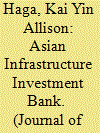

|
|
|
|
|
| Summary/Abstract |
In 2013, China's growing economic capacities motivated Beijing to launch a multilateral bank to advance its diplomatic agenda. Scholars are still debating precisely what Beijing seeks to accomplish through the Asian Infrastructure Investment Bank (AIIB). This article surveys the key literature on the AIIB, identifying twenty scholarly interpretations of Beijing's strategic goals. The purpose of this research is to understand Beijing's initial design for this bank and evaluate whether this new multilateral development bank can function as an effective instrument for Beijing's economic statecraft. Over its first five years, as an economic tool for Beijing, the AIIB has performed quite remarkably well. The bank not only operates smoothly, generating a reasonable amount in net income for its shareholders, but also serves Beijing's strategic purposes in expanding China's regional influence, enhancing its international status, and ascending toward global leadership.
|
|
|
|
|
|
|
|
|
|
|
|
|
|
|
|
| 2 |
ID:
184222
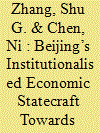

|
|
|
|
|
| Summary/Abstract |
This study adopts an institutional approach in the case analysis of China's economic statecraft towards Brazil. In light of institutionalisation theory, it examines the institutional arrangements between Beijing and Brasilia for the purpose of facilitating bilateral economic cooperation and advancing strategic partnership. As a descriptive effort, it yields some preliminary findings: first, the institutionalisation of China's economic statecraft towards Brazil is incremental, driven largely by the desire for and belief in long-term planning; second, a set of norms, values, and principles is instituted alongside designated agencies, point persons, operational protocols, and exchange mechanisms, creating a form of institutional governance based on a multi-actor, multilevel, and network-based steering mode; third, governance remains so centralised that it falls short in empowering strategic participation; and, fourth and finally, Beijing's institution-building proves useful in the management of relations with Brazil, suggesting that economic statecraft may benefit from institutionalisation.
|
|
|
|
|
|
|
|
|
|
|
|
|
|
|
|
| 3 |
ID:
192165
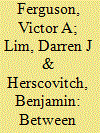

|
|
|
|
|
| Summary/Abstract |
For nearly four decades, Australia’s domestic and international economic policies were anchored by the promotion of open, transparent, and rules-based market exchange. This was considered the best way to increase both Australia’s prosperity and its security, and that belief guided Canberra’s approach to economic statecraft. However, emerging concerns about the vulnerabilities arising from economic interdependence, and the increasingly blurry line between economics and security amid great power rivalry between China and the United States, have placed Australian policy orthodoxy in a difficult position. In this paper, we investigate how these dynamics are shaping change and continuity in Australia’s economic statecraft, and in doing so offer three contributions. First, to advance the emerging comparative economic statecraft research agenda, we propose a modified concept of economic statecraft that captures a wider range of activities undertaken by non-great powers and a distinction between state-based and market-based actions which allows for within- and cross-case comparisons. Second, empirically, we sketch the historical evolution of Australia’s approach and examine three salient domains in which it has recently pursued new economic statecraft initiatives. Finally, in evaluating recent change and continuity, our third contribution is to identify new variables that may illuminate the conditions under which states adapt their prevailing approach to economic statecraft.
|
|
|
|
|
|
|
|
|
|
|
|
|
|
|
|
| 4 |
ID:
184225
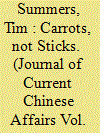

|
|
|
|
|
| Summary/Abstract |
This analysis offers a historical assessment of “economic statecraft” in Beijing's approach to Hong Kong from 1997 to 2020. It discusses how the concept of “economic statecraft” can be applied to Beijing–Hong Kong relations given the nature of the “one country, two systems” framework, and looks at some differing perceptions about economic statecraft in Hong Kong. It argues that, during this period, economic tools were in general used by Beijing relatively sparingly, and in the form of inducements rather than coercion. In conclusion, the analysis suggests that the contested interpretations of Beijing–Hong Kong economic relations demonstrate that “economic statecraft” is to a certain extent in the eye of the beholder.
|
|
|
|
|
|
|
|
|
|
|
|
|
|
|
|
| 5 |
ID:
140640
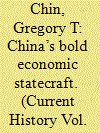

|
|
|
|
|
| Summary/Abstract |
China’s global profile is changing dramatically. An active member of the United Nations and the Bretton Woods organizations (the International Monetary Fund and the World Bank) since the mid-1970s, Beijing is now building new multilateral financial institutions where it sits at the center of the table, making rules and setting standards. After the two decades from the 1980s to the early 2000s, when it aspired mainly to integrate into the existing international economic institutions, China has transformed into an increasingly confident global actor, keen to capitalize on its accumulated resources and experience, and looking to assert itself more prominently in the world economy.
|
|
|
|
|
|
|
|
|
|
|
|
|
|
|
|
| 6 |
ID:
152944
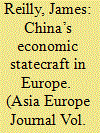

|
|
|
|
|
| Summary/Abstract |
China’s economic statecraft in Europe relies upon three distinct strategies: specific and diffuse reciprocity, and strategic engagement—each designed to advance a specific type of policy objective. However, the tensions between a reciprocity and engagement strategy have undermined China’s efforts to reassure Europeans of Beijing’s benevolent intent. This article compares Beijing’s three strategies through case studies of China’s efforts to discourage European receptions of the Dalai Lama, secure market economy status, and Beijing’s response to Europe’s post-2009 financial crisis.
|
|
|
|
|
|
|
|
|
|
|
|
|
|
|
|
| 7 |
ID:
136712
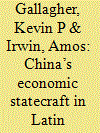

|
|
|
|
|
| Summary/Abstract |
Most scholars and policy-makers classify the motivation behind China’s global economic activity as an effort to project soft power or to exercise “extractive diplomacy” by locking up natural resources across the globe. In this paper we argue that China, through its state financial institutions and firms, is also significantly motivated by simply commercial reasons. To shed light on this debate, we examine the extent to which China’s policy banks provide finance to sovereign governments in Latin America. We find that Chinese policy banks now provide more finance to Latin American governments each year than do the World Bank and Inter-American Development Bank (IDB). Indeed, the large loan size, high interest rates and focus on industry and infrastructure of Chinese finance has less in common with these international financial issue_images_88_1_ChinaLatinAmerica01institutions (IFIs) and more in common with the private sovereign bond market. In this way, Chinese finance appears primarily commercial in nature. Chinese banks offer slightly lower interest rates than the private market, but these are not necessarily concessional subsidies to support a political agenda. The Chinese banks are exposed to less risk because they tie their loans to equipment purchase requirements and oil purchase contracts. Through these risk-lowering arrangements, Chinese banks can profit by lending to countries that have been priced out of the sovereign debt market. While it can be difficult to distinguish between the three types of economic statecraft outlined above, we argue that commercial profit is also a major force behind China’s economic statecraft that has been largely overlooked.
|
|
|
|
|
|
|
|
|
|
|
|
|
|
|
|
| 8 |
ID:
187157
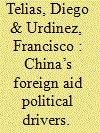

|
|
|
|
|
| Summary/Abstract |
This study investigates a novel dataset comprised of a universe of 537 donations in 33 countries in Latin America and the Caribbean, between 11 February and 20 June 2020, which provides a high level of detail on China’s and Taiwan’s mask diplomacy. We describe who the main donors were, who the main recipients were, what was donated to each country, and which variables explain why some countries received more aid than others. Drawing on previous literature, the article advances understanding about the political determinants of these donations. Our findings revealed that, although seemingly uncoordinated, donations made by China’s central government, Chinese companies, cities, and foundations were strongly affected by two political determinants, namely the recipient’s partnership status with China and the One China Policy. Furthermore, aid provided by China’s Central Government was larger in autocracies than in democracies.
|
|
|
|
|
|
|
|
|
|
|
|
|
|
|
|
| 9 |
ID:
141102
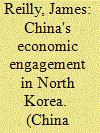

|
|
|
|
|
| Summary/Abstract |
Since 2005, central Chinese leaders have successfully encouraged local governments and commercial actors to expand their economic interactions with North Korea. However, the resulting expansion in commercial actors and economic interactions has intensified a principal-agent dilemma for Chinese leaders, exacerbating diplomatic tensions, eroding border security, and undermining popular support for Beijing's engagement strategy. In comparison with China's other neighbours, North Korea presents both a difficult case for stimulating economic engagement and a relatively easy case for enforcement. These dynamics are even more likely to emerge across China's 13 other land neighbours.
|
|
|
|
|
|
|
|
|
|
|
|
|
|
|
|
| 10 |
ID:
124644
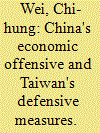

|
|
|
|
|
| Publication |
2013.
|
| Summary/Abstract |
This article explains how Taiwan's Democratic Progressive Party (DPP) administration was able to restrict cross-Strait fruit trade and resist China's "fruit offensive" in a democratic setting. During 2004-2005, China implemented various preferential policies for the importation of Taiwanese fruit and wooed Taiwanese farmers in the rural south, where political support for the DPP was concentrated. However, trade statistics show that cross-Strait fruit trade only increased slightly, making up just 4 or 5 per cent of Taiwan's total fruit exports during 2005-2008. I argue that focusing solely on regime type ignores the formal and informal policy instruments a democratic state can wield to manage its commercial ties with, and resist economic offensives from, other states. Cross-Strait fruit trade was limited because the DPP used legal as well as corporatist informal policy instruments to resist China's fruit offensive. I conclude that state-society institutional relations explain cross-Strait economic relations and economic statecraft better than regime type alone.
|
|
|
|
|
|
|
|
|
|
|
|
|
|
|
|
| 11 |
ID:
181837
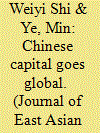

|
|
|
|
|
| Summary/Abstract |
The Belt and Road Initiative (BRI), and China's state-led model for economic globalization more generally, have attracted controversy: Are state-led overseas investment and lending driven by strategic motives or market rationale? How have the recipient economies reacted to the influx of Chinese capital? This special issue sheds light on these questions by first outlining the fragmented state system driving the BRI, a system featuring both Beijing's strategic logic at the top and market considerations in policy implementation. The role of the state is unpacked further in China's globalizing coal industry and in the growth of Chinese industry export to BRI countries. Finally, the issue explores the mechanisms behind public backlash and political pushback facing China in Zambia and Australia. As the COVID-19 pandemic continues to shift China's relationship with the world, this special issue contributes to a more nuanced understanding of the modus operandi of Chinese capital going global.
|
|
|
|
|
|
|
|
|
|
|
|
|
|
|
|
| 12 |
ID:
184223
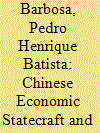

|
|
|
|
|
| Summary/Abstract |
Over the last years, Brazil and China's oil-related finance activities have expanded substantially. Between 2007 and 2019, Brazilian companies received approximately one-fourth of Chinese policy banks overseas oil-related loans, and Chinese financial institutions became Brazil's biggest oil company Petrobras’ main creditor. A deep analysis of these loans highlights their usage as economic statecraft tools, with impacts on the bilateral crude trade and investments. Loan-for-oil mechanisms, content purchase requirements, and a countercyclical lending pattern have helped to influence Brazilian players to behave in a manner conducive to the Chinese state's energy security objectives and strategic goals, namely increase of imports, diversification of sources, and internationalisation of firms. With these loans, China has satisfactorily guaranteed a stable oil supply over time and has helped Chinese equipment makers and service providers to expand their footage in Brazil.
|
|
|
|
|
|
|
|
|
|
|
|
|
|
|
|
| 13 |
ID:
184221
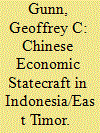

|
|
|
|
|
| Summary/Abstract |
From inside China’s Belt and Road Initiative (BRI), two southern tier nations offer contrary perspectives as to the efficacy of Beijing’s economic statecraft, namely Indonesia and East Timor. While obviously asymmetric in practically every respect, nevertheless a careful study of these two nations’ bilateral links with China over long and short times offers salutary lessons on infrastructure financing in particular. Several interconnected inquiries are interposed. In a nation known for its competing political elites and support bases, how successful has China been in micro-managing its relations with Jakarta over trade and investment deals even carrying through to a post-authoritarian order? How has newly independent albeit aid-dependent Timor-Leste been able to parlay the China connection? Mixing documentary with primary research in situ, the inclusion of the East Timor case adds a missing link in the growing literature on the BRI.
|
|
|
|
|
|
|
|
|
|
|
|
|
|
|
|
| 14 |
ID:
174784
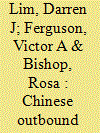

|
|
|
|
|
| Summary/Abstract |
China’s growing economic strength provides Beijing with potent instruments of economic statecraft to pursue political and strategic objectives. Yet studies of economic power and Chinese economic statecraft tend to concentrate on trade in goods, outbound investment, and international institutions. This article broadens this research program into trade in services by focusing on China’s outbound tourism sector. Drawing on a variety of Chinese and English language sources, the authors describe the history and structure of the domestic regulatory framework governing Chinese outbound tourism, before studying instances where the government has apparently intervened for strategic purposes. By unpacking how Chinese consumers arrange overseas holidays, this article provides insights into how the market structure of this service industry creates both opportunities for and constraints on China’s economic power.
|
|
|
|
|
|
|
|
|
|
|
|
|
|
|
|
| 15 |
ID:
192158
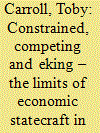

|
|
|
|
|
| Summary/Abstract |
This paper highlights the highly contingent and constrained possibilities for states concerned with gaining and maintaining economic and, relatedly, strategic advantage in East Asia in a world dominated by global value chains (GVCs) owned and controlled by transnational capital. While the reorganisation of production has given rise to new contender states such as China, challenging the economic and strategic positions of others, the ability for states to engage in non-market conforming behaviour designed to reduce technological dependence, accumulate reserves and embolden national positions against competitors is far more constrained than it once was. Prioritising the relative power and leverage of states operating in various contexts over time, three types of state are identified within contemporary East Asia: former developmental states under persistent competitive pressures compelling very different policy agendas to those that underpinned their respective development stories; a somewhat exceptional constrained “aspirant state”, attempting mercantilist strategies to achieve strategic upgrading under the spectre of systemic exclusion and formidable domestic challenges; and, finally, relatively vulnerable “eke-out” competition states, attempting to leverage labour cost, geography and regulation to maintain economic relevance within the context of hyper competitiveness while also engaging in forms of quarantining and patronage. Our overarching argument is that the latitude to both pursue and leverage ES strategies common in the past is all but gone, even for the most powerful of contender states.
|
|
|
|
|
|
|
|
|
|
|
|
|
|
|
|
| 16 |
ID:
160575
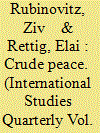

|
|
|
|
|
| Summary/Abstract |
Does trading oil promote peace between rival countries? Despite the optimism of liberal theories on the value of economic interdependence, countries worry more about the possibility of being cut off from vital oil supplies than about forgoing the potential economic gains of trade. The 1979 Israeli-Egyptian peace is an exception to this rule, as the inclusion of oil trade agreements during negotiations succeeded and eventually became a positive aspect of the relations between the two states. However, this resulted not from the promotion of economic interdependence during negotiations, but from its avoidance. The United States guaranteed to compensate Israel for any breach in the oil agreement. This permitted Israel and Egypt to trade freely without imminent concern of becoming too dependent on one another. In consequence, they slowly built mutual trust over the years. Israeli and US declassified documents shed light on the creation of this unique oil trade agreement during the final phase of peace negotiations. We argue that a third-party guarantee to compensate for a breach in energy trade is often a necessary condition for such deals to succeed, provided that the guarantor meets certain preconditions unique to energy trade.
|
|
|
|
|
|
|
|
|
|
|
|
|
|
|
|
| 17 |
ID:
182672
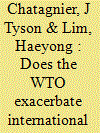

|
|
|
|
|
| Summary/Abstract |
As one component of its mission to reduce trade barriers and encourage the liberalization of international commerce, the World Trade Organization provides states with a forum in which they can raise and resolve complaints about partners’ unfair trading practices. This mechanism streamlines the process of identifying non-compliant behavior, and provides real incentives for the removal of such policies. By furnishing a form of dispute resolution, the institution should be both trade-inducing and peace-enhancing for member states. However, this very mechanism also has the potential to aggravate existing dispute for two reasons. First, it removes the opportunity for states to use economic policies as instruments of structural linkage in resolving disputes. Second, it deprives its members of powerful economic tools that could be used in lieu of militarized responses. Using the implementation of the WTO Dispute Settlement mechanism, as well as the subsequent expiration of Article 13 of the WTO Agreement on Agriculture (the so-called ‘peace clause’), we examine whether the opportunity to resolve trade disputes through the organization affects the likelihood that member states engage in militarized conflict with one another. We find that membership in a trade institution facilitates peaceful interaction, but that judicialization erases these benefits. We conclude that institution building requires caution and attention to the possibility of unintended consequences.
|
|
|
|
|
|
|
|
|
|
|
|
|
|
|
|
| 18 |
ID:
183159
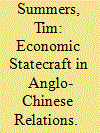

|
|
|
|
|
| Summary/Abstract |
This analysis demonstrates the use of economic statecraft in Anglo-Chinese negotiations over a new airport for Hong Kong. Leading to the signing of a memorandum of understanding in 1991, Chinese negotiators used bargaining leverage to withhold support for the airport and related projects to obtain British agreement for ‘consultation’ over major projects that straddled the transfer of sovereignty in 1997. Subsequent British flexibility on the timing of the project’s completion meant that Chinese attempts to use leverage on the airport in further talks after 1992 were somewhat less effective. Nevertheless, wider difficulties in the bilateral relationship and the legacy of distrust slowed detailed negotiations over airport financing, with the final pieces only put in place in 1995. Based on the perceptions of negotiators on both sides, there existed a tendency for each side to see their negotiating position as reasonable and justified, and the other as duplicitous or unreliable.
|
|
|
|
|
|
|
|
|
|
|
|
|
|
|
|
| 19 |
ID:
113287
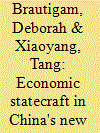

|
|
|
|
|
| Publication |
2012.
|
| Summary/Abstract |
China's rapidly growing economic engagement with other developing countries has aroused intense debates, but these debates have often generated more heat than light. The Chinese government is clearly pushing its companies to move offshore in greater numbers, and state-owned firms figure prominently in many of the major investments abroad. Yet relatively little research exists on when, how and why the Chinese government intervenes in the overseas economic activities of its firms. China's state-sponsored economic diplomacy in other developing countries could play three major strategic roles: strengthening resource security, enhancing political relationships and soft power, and boosting commercial opportunities for national firms. This article examines China's programme to establish overseas special economic zones as one tool of Beijing's economic statecraft. It traces the process by which they were established and implemented, and investigates the characteristics of the 19 zones initially selected in a competitive tender process. The article concludes that even in countries rich in natural resources, the overseas zones were overwhelmingly positioned as commercial projects. Particularly in the Asian zones, China is following in the footsteps of Japan. The zone programme, and the Chinese foreign investment it hoped to foster, represents a clear case of the international projection of China's developmental state. However, in Africa (but not generally elsewhere) discourse surrounding the zones publicly positions them as a transfer of China's own development success, thus potentially enhancing China's political relationships and soft power on the continent.
|
|
|
|
|
|
|
|
|
|
|
|
|
|
|
|
| 20 |
ID:
169186
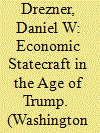

|
|
|
|
|
|
|
|